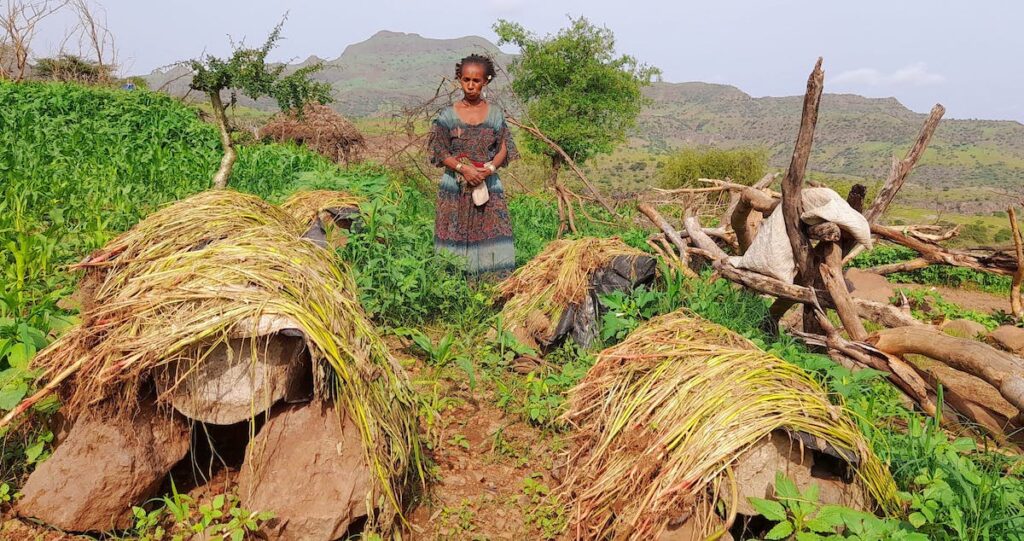Gelawe Melekamu is a 36-year-old widowed mother of six who lives in Mendere Cherkos, a community in Ethiopia. Her quarter-hectare farm did not produce enough to feed her family, and the arid climate and drought contributed to crop failure year after year.
Gelawe’s only income came from two traditional beehives with annual honey production of less than four kilograms (eight pounds). Income from the sale of the honey was woefully inadequate to cover the family’s basic needs.
“My annual income was 583 ETB,” said Gelawe, referring to the abbreviation for the local currency of Ethiopian Birr. In US dollars, her yearly income was equivalent to $11.
No Opportunities for More Work
“I am a widow responsible for feeding six children, five of my own and the youngest is adopted,” she said. “I felt inadequate, as I was unable to provide my children enough food or clothes.”
Gelawe explained that there was no work available in the village to help with expenses. “We often went to bed without food,” she said, adding that lack of funds for required school supplies frequently prevented her children from attending school. When they did attend, she said, “I felt guilty about sending them with neither breakfast nor lunch, because there is no school meal program in the village.”
Livelihood Help Starts with a Safety Net
As a result of all these limitations, the family qualified to participate in the USAID-funded Productive Safety Net Program (PSNP). The family began receiving food commodities – 105 kg of wheat, 10.5 kg of pulse (a type of legume like chickpeas), and 3.5 kg of cooking oil – for six months of the year.
Additionally, Gelawe received livelihood training in honey production and modern beekeeping through FH Ethiopia. Her greatest challenge to successfully pursuing this work, she said, was her inability to access startup capital, since she did not qualify for traditional loans.
A Cash Infusion Offers Opportunity
Fortunately, the USAID-funded PSNP included a second, cash-transfer element, in addition to the food provision. Because Gelawe fell in the poorest quintile (20%) of her area, she qualified for this cash payment, specifically for people like her who would have difficulties accessing credit as a result of low income.
The program’s cash payment was equivalent to $300 USD, paid out in Ethiopian Birr (ETB).
Called “livelihood transfer funds,” the payment helps fund the creation of sustainable livelihood opportunities to lift recipients out of poverty and provide long-term resilience.
Honey Provides a Sweet Solution
Her training through FH included technical support on beekeeping, transitional beehive construction, and queen bee raising. And she said the livelihood transfer funds made it possible for her to buy materials and construct nine additional beehives, making her success possible.

“It lifted my burden. The food I receive helps us through the difficult months of the year, enabling me to feed my family three times a day,” Gelawe said. And now, through her beekeeping business, she earns over 24,700 ETB ($466 USD). That’s equivalent to $466 USD each year, considerably more than her previous annual income of $11 USD.
Hope for the Future
“This cash that I earn from the honey sales makes it possible for me to buy clothes and school supplies for my children,” she said. “Instead of feeling inadequate, I look forward to a future full of hope.”

With 15 of her neighbors, Gelawe helped establish a Village Economic and Social Association (VESA) through FH. The group will give her future access to funds to help grow her business.
Saving Women and Children
Cash transfer programs such as the one that helped Gelawe and her family are saving lives, according to an article in a June 2023 issue of the journal Nature.
Cash grants made directly to poor families have led to fewer deaths among women and young children, according to a new analysis of more than 7 million people in 37 countries,” the report said, adding that “deaths among women fell by 20 percent, and deaths among children younger than 5 declined by 8 percent.”
Gelawe said that she is much more confident now that she can earn her own income and take good care of her family.
“My family no longer goes to bed hungry,” she said. “And I have a plan to increase my number of beehives by using the queen-rearing technology I learned.”
Strengthening Her Own Community
Gelawe is now planning to be a co-trainer, strengthening her community by teaching others there the beehive construction method that she has mastered.
“I’m happy to train my neighbors in beekeeping,” she added. “For years, I was one of the destitute widows in the village. No one considered my words worthy to hear. But now other members of the community come to ask for my advice as an expert.”
See Similar Posts:
Gender Equity Awareness Transforms a Father in Ethiopia


